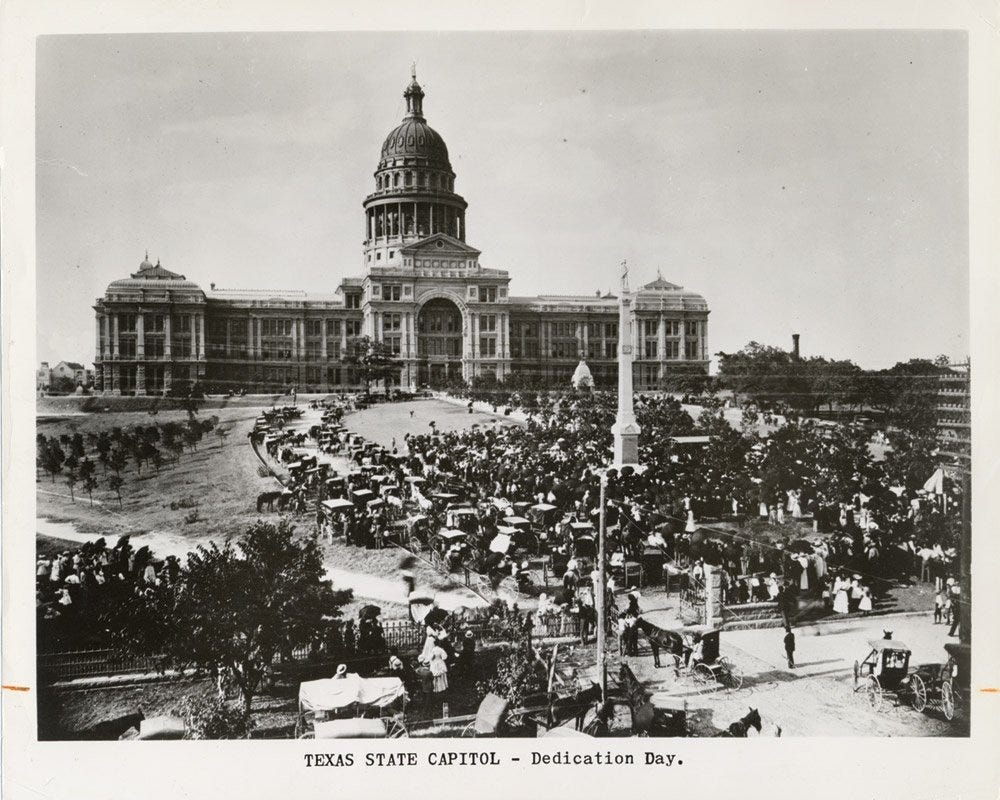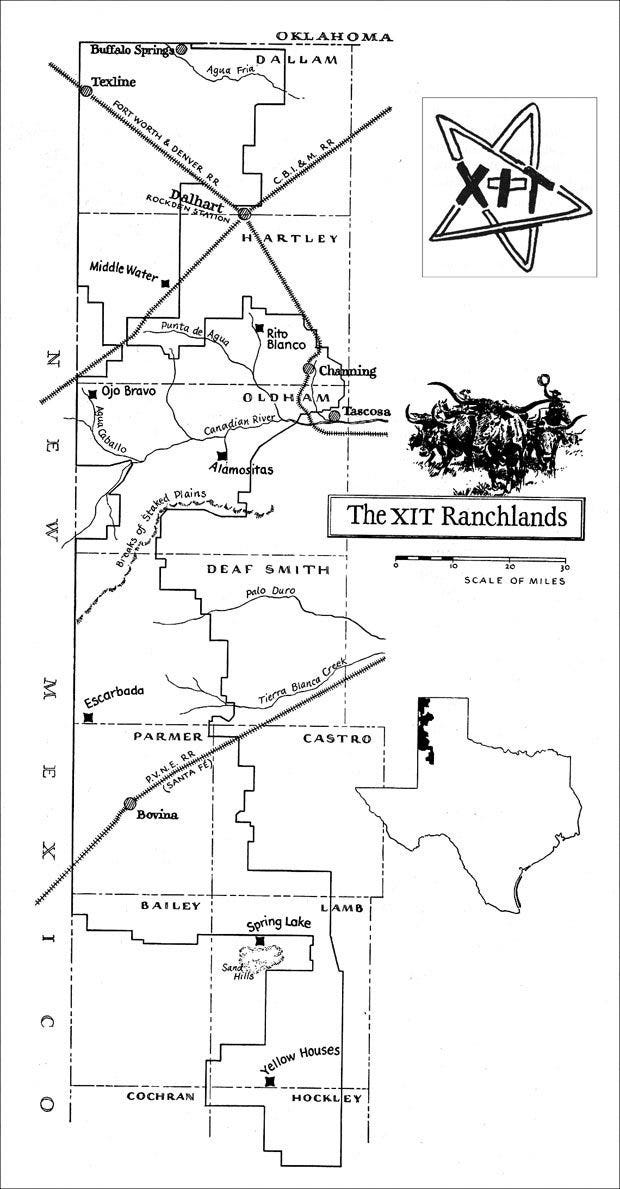The XIT Ranch Rules of 1885
The XIT brand was conceived of by an old Texas trail driver named Ab Blocker, who placed it upon the first cow. She was not an animal of high pedigree, but a Longhorn from South Texas. Her color, gauntness, and perversity were historic.
J. Evetts Haley
The famed XIT Ranch, unlike so many other large ranches in Texas—the Waggoner, the Four Sixes, and the King—was own and operated by a syndicate of out-of-staters and foreigners who knew more about ordering steak at a swanky establishment than they did about working the animal that produced the steak. The XIT came about as a land deal between the state of Texas and private investors. In 1879, the Sixteenth Texas Legislature appropriated three million acres of unsettled Panhandle land to finance the construction of a new capitol building. The legislature appointed a Capitol Board, made up of the governor, comptroller, treasurer, attorney general, and land commissioner, to find an investor and contractor for the building. The need became urgent when the old capitol building burned to the ground on November 9, 1881.
In early 1882, the Capitol Board found their man in Mathias Schnell of Rock Island, Illinois, who eventually transferred his interest to the Chicago firm of Taylor, Babcock & Company, which formed the Capitol Syndicate. Principle investors were Colonel Abner Taylor, Colonel Amos Babcock, and brothers Charles B. and John V. Farwell. The investors of the Capitol Syndicate put up $3,224,593.45 to purchase the land from the state. The new capitol building, which was completed in April 1888, cost $3,744,630.60, with the state making up the difference. The plan of the Capitol Syndicate was to parcel out tracks to recoup their investment. However, until that time the land should be utilized for commercial production. They believed the best use was for raising cattle. They therefore established the XIT Ranch.
Babcock first came to Texas in March 1882 to survey the land. Along with a surveyor, several local cowboys, and a Mexican cook, Babcock mapped the land from Buffalo Gap in the north to Yellow Creek in the south. It took thirty-six days to inspect the rangeland, traveling over 950 miles north to south, east to west. The spread, rich in soil, grass, water, timber, rock, and natural shelter, was more than 220 miles north to south along the New Mexico border. Upon returning to Chicago, Babcock told the investors of the Capitol Syndicate that the land should be immediately fenced and stocked with Central and South Texas longhorn cattle, and windmills erected.
To secure the enormous amount of finances necessary to develop the ranch, John Farwell sailed to England in late 1884 and formed the Capitol Freehold Land and Investment Company of London. With wealthy British backers, such as the Earl of Aberdeen and Henry Seton-Kerr, a member of Parliament, Farwell raised the equivalent in today’s money of roughly five million dollars.
Under the direction of the Capitol Syndicate, John Farwell hired B. H. “Barbecue” Campbell of Wichita, Kansas, as the XIT’s first general manager. He received his nickname from his Bar BQ brand used to mark his livestock on his Medicine Lodge Creek Ranch in Indian Territory. The Capitol Syndicate established the first ranch headquarters at Buffalo Springs, which received its first shipment of 2,500 head of longhorn cattle on July 1, 1885, having been trailed from the Fort Concho area by Abner P. Blocker. According to legend, Blocker devised the famous XIT brand by drawing it in the dust with the toe of his boot. Campbell wanted a distinctive brand, one that looked good and sounded good, was easy to burn in, and hard to alter with a rustler’s road iron. Popular legend claims “XIT” stands for “Ten in Texas” since the ranch covered all or portions of ten counties—Dallam, Hartley, Oldham, Deaf Smith, Parmer, Castro, Bailey, Lamb, Cochran, and Hockley. Others, however, claim the brand stands for “Big in Texas.”
With the ranch established, Barbecue Campbell drew up twenty-two rules to govern the cowboys who rode for the XIT brand. He had it printed in a booklet late in 1885. This was what was expected of every cowboy and cook who worked on the XIT in the early days.
I
Six-shooters or other small firearms will not be permitted to be carried on the ranch. If there were no other reasons, it is forbidden by statute in the state of Texas.
II
Card-playing or gambling of any kind is strictly prohibited on this ranch.
III
Sunday will be observed as a day of rest by all employees if it does not conflict with round-up work in which our neighbors are interested, nor to the detriment of the interests of the ranch.
IV
Men are expected to conduct themselves with proper decorum about camp.
V
All persons having the care or use of animals belonging to the ranch will be required to handle them carefully and treat them kindly.
VI
Horses are furnished for the care of cattle and for other useful purposes, and they must not be used to run wild horses or buffalo, or antelope, nor to run races.
VII
The spur, if used at all, should be so used as never to gore or tear the flesh of a horse, and should never be used forward of the saddle. The quirt is much preferred, but this should never be used to strike the horse on the head, neck or shoulders. The rear of the horse is the proper place to administer punishment. It is a particularly brutal act to kick a horse in the body with the boot.
VIII
When a rider stops to rest, or to hold a long conversation, he should also rest his horse; and, in order to do this, he should dismount; and, when the rider stops to eat, he should also feed or graze, and water his horse, and during this time saddle and bridle should be removed.
A poor, tired horse, on a hot day, does not get much rest with a forty pound saddle and a wet blanket weighing half as much more scalding the back.
When accustomed for years on the frontier to severe hardships, and frequently witnessing scenes of suffering amongst themselves, men naturally become indifferent to the feelings of the lower animals; but with the improved facilities for conducting the cattle business, and particularly with the conveniences and comforts with which we are surrounded as compare to the past, and the generous compensation paid for our labor as compared with other industries, we ought to live above the barbarous practices which characterized the early days of the cowboy, and which could not safely be condemned ten years ago.
IX
Cattle should never be run except in cutting out, or in some emergency when the success of the work positively requires it. The profits of the cattle business consist in the growth and fattening of the cattle; in branding or driving the utmost care and kindness must be practiced.
X
Men will not be permitted to leave the ranch at their own will, and still hold their places. If a hand can be spared to make a trip to the railroad, to be absent several weeks as inclination may suggest, it proves, as a rule, that he was not much needed, and his name had better be dropped from the pay-roll. There are exceptions to this rule which the foreman in charge of the men will be permitted to make.
XI
No employee will be permitted to ride a company horse unless on company business without special permission of the manger.
XII
No person on the ranch will be permitted to sell or trade company horses except M. A. Nations, who is at present employeed to sell a certain brand of horses, and these will, in no case, be sold on time.
XIII
Stray cattle and horses found in this enclosure will be cared for the same as stock belonging here, and in no case will stray horses be permitted to be used, and the men here are particularly cautioned against buying or trading for any horses, unless positively certain that the seller has an honest title to the property. The fact that the brand is not known to belong to another party is no proof that the animal belongs to the part offering it, and the safest way is to let such property alone.
XIV
In the case of stray cattle, though they be “Mavericks,” they must in no case be killed for beef. The XIT ranch will eat XIT beef or go without.
XV
The practice of killing calves for veal must be stopped. The carcass of a calf for food may possibly be worth two dollars, but with a small amount added for expenses and risk, he will soon be worth thirty dollars, and the employee who has a proper regard for the welfare of the company who so generously pays him for his services will not be guilty of such wanton waste.
Beeves will not be permitted to be killed unless the force is large enough to consume the meat before it becomes unfit for use, or other provision be made to salt and preserve it.
All hides taken from beeves will be stretched in a conspicuous place on the storehouse at Buffalo Springs.
XVI
The cooks at all camps are required to be cleanly, and to exercise a saving care over all provisions and supplies furnished; and the cooks at all but headquarters are held responsible for the property immediately about camp.
XVII
All persons visiting the ranch on business, as well as those passing across the country, will be freely entertained with the best the ranch affords; but tramps and idlers will be permitted to pass on after one night’s entertainment.
XVIII
The pay-roll will be made out on the 16th of each month, but employees may draw money at any time. Payment will be made by sight-draft on Chicago, which can be cashed at par at the first point the holder reaches where currency can be obtain or used. No person will be permitted, in any case, to overdraw his account as the manager has no authority to lend money.
XIX
Every person, no matter what his rank or relation to the business, who pretends to be employed on the ranch, and who draws pay will be subject to these rules, and any other which the manger may see fit to make.
So far, the owners of this property have provided no place for idlers, and the manger has been instructed by them to see that every man performs some useful duty, and renders a fair equivalent for the compensation which he accepts.
XX
The foreman of the ranch is authorized to contract to pay the customary wages for first-class cow-boys, but where special bargains are required for extra services, the question of compensation will be referred to the manager to arrange, and in no case will the foreman be permitted to have pets or favorites in his service.
XXI
The foreman is expected to work and to see that every man under him is employed in a profitable manner, and any indifference to this rule, or any other, will suggest a change without further notice.
XXII
It shall be the duty of the foreman and others having charge of men, to see that these rules are strictly observed, and, in a case of violation, to discharge the offender.
In conclusion, the manger has to say that, like the others employed here, he is working for wages which are promptly and generously paid, and he asks all employees to take hold like honest men and help him to make this enterprise successful.
B. H. Campbell,
Manager.
Three years later, in 1888, Campbell was not longer manger of the XIT, Albert G. Boyce was. He wrote his own set of ranch rules—twenty-three in all, similar to the ones Campbell drew up.





